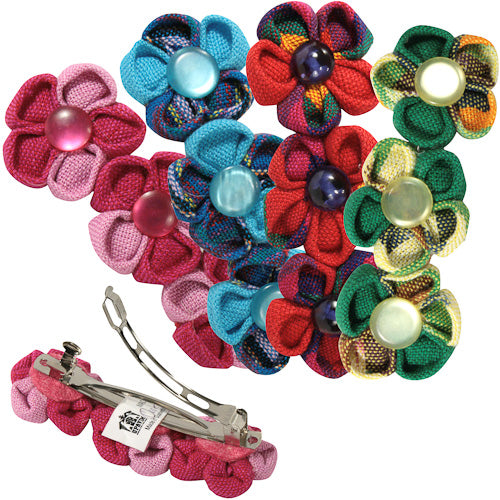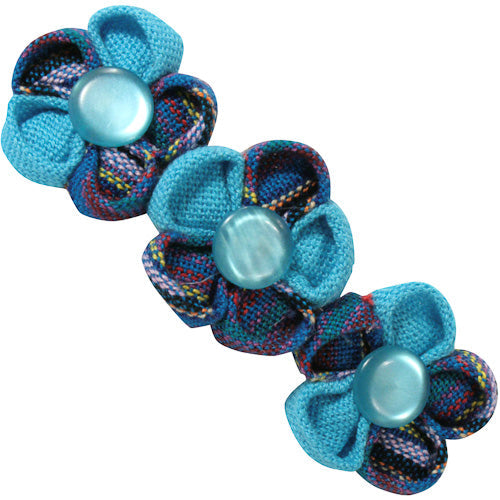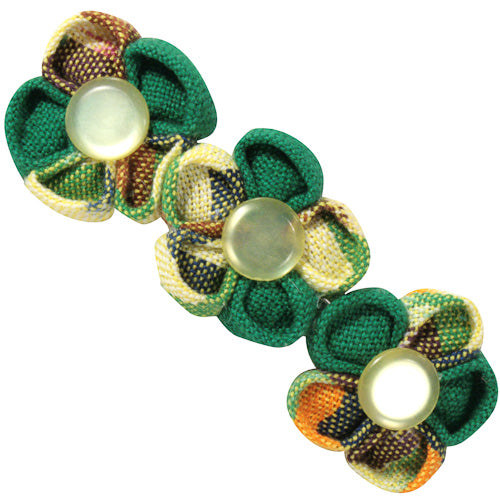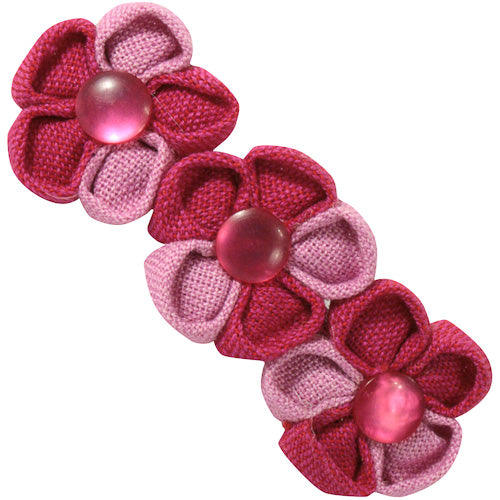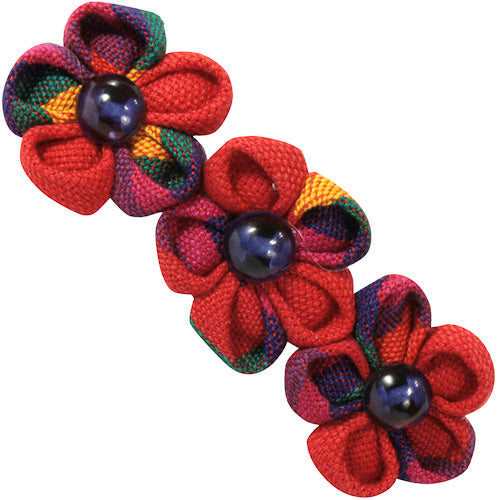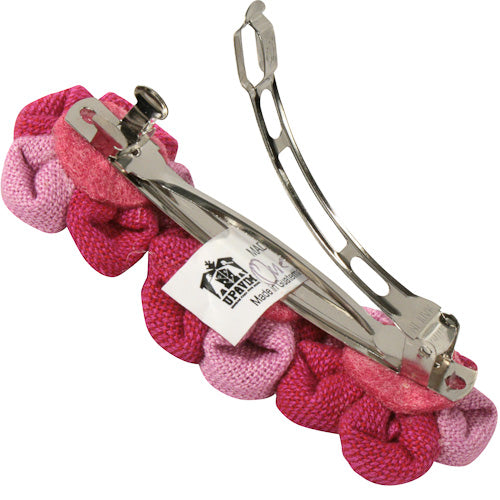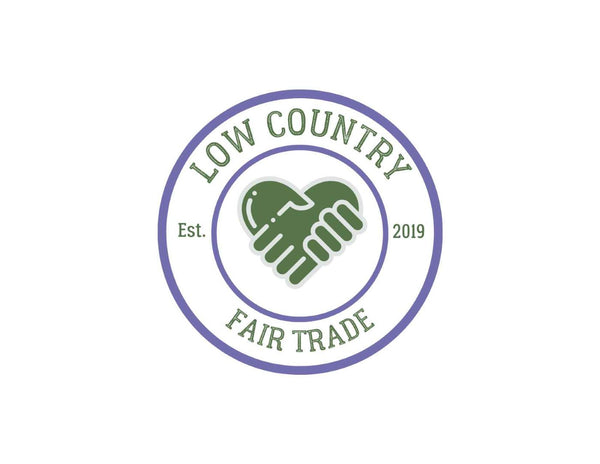OWP
Cotton Barrette with 3 Flowers
Cotton Barrette with 3 Flowers
Couldn't load pickup availability
Add some fair trade style to your hairdo with these pretty flower barrette clips. Made from hand-woven Guatemalan fabrics, these pretty hair accessories are handmade by women artisans from the UPAVIM cooperative on the outskirts of Guatemala City. UPAVIM, which stands for United for a Better Life, is an 80 member artisan enterprise helping women through social and economic empowerment. In addition to training women in creating various handmade textiles, UPAVIM has established a school, a pharmacy and a bakery within their cooperative.
- Measure 3-3/4” high x 1-1/4” wide, with 2-1/4” clip
Handmade in Gutemala and fair trade imported.
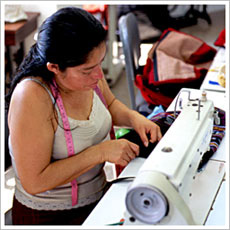
UPAVIM Crafts is a cooperative of women who live in marginalized communities on the outskirts of
Amongst some of the achievements, In 2002 the cooperative was awarded the best Non-traditional Textile Exporter award by AGEXPRONT, a national trade organization, also UPAVIM’s Montessori school was recognized by the Guatemalan government.
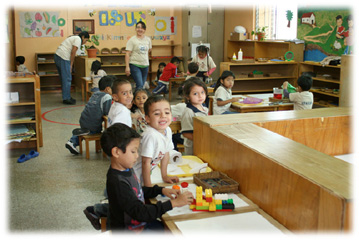
The main product line made by these women artisans includes bags, purses, wallets, aprons and holiday ornaments, most of these products are made from the traditionally woven Mayan textiles which are locally available. By procuring the traditional textiles, the organization also helps promote traditional weavers of the region and brings a local flavor and uniqueness to their products. This also cuts down the role of middlemen and creates a chain of fair wages and fair prices - from the weaver, to the seamstress, to the customer.
Apart from craft making, UPAVIM also initiated other small scale businesses which include a bakery, soy milk factory, and an internet center. The main aim was to increase the means of employment for the community members of La Esperanza, so that they can gain optimum benefits from the program.
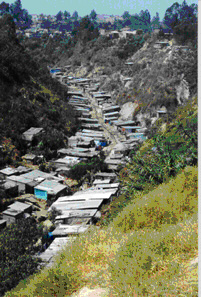 The cooperative is located in a squatter settlement called La Esperanza (Hope), where every day the communities faced various social challenges including gang violence, illiteracy, unemployment, malnutrition, alcoholism, child abuse and drug abuse. Even though the challenges for community growth in an area that receives little government attention may be high, but today after 2o odd years and initiatives by UPAVIM and the women, the conditions have changed for the better in this “City of
The cooperative is located in a squatter settlement called La Esperanza (Hope), where every day the communities faced various social challenges including gang violence, illiteracy, unemployment, malnutrition, alcoholism, child abuse and drug abuse. Even though the challenges for community growth in an area that receives little government attention may be high, but today after 2o odd years and initiatives by UPAVIM and the women, the conditions have changed for the better in this “City of
Share
About the Artisans
About the Artisans
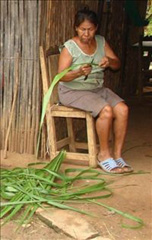 Joyeria Semilla meaning Seed Jewelry is a small fair-trade workshop in the Andean town of Villa de Leyva, Colombia. Girasol Taborda, a local artisan and social entrepreneur, started the workshop in the mid-1990s.
Joyeria Semilla meaning Seed Jewelry is a small fair-trade workshop in the Andean town of Villa de Leyva, Colombia. Girasol Taborda, a local artisan and social entrepreneur, started the workshop in the mid-1990s.
Joyeria Semilla’s objective is three-folds; to create new jobs, revive Colombia's handicrafts sector and to motivate locals to better manage their natural resources. The organization works primarily with socially and economically disadvantaged youths, single mothers and people with disabilities in the area. The company offers free training in product design, technical training and marketing to new members. Joyeria Semilla has trained them in the craft of jewelry-making.
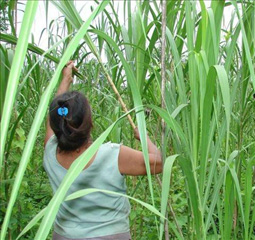
Caña Flecha or “Gynerium Sagittatum” is a locally found palm tree in the regions of the Caribbean coast. The leaves from this plant are used for making jewelry, woven hats, bags and baskets. The Zenú Indians were and their descendants inherited the tradition of picking veins of the green palm leaf for weaving. These veins were made into woven hats and other products for their personal use.
The Zenú culture is said to have existed between 200BC to1600AD. With the arrival of the colonizers in the 16th century, the indigenous community declined of unknown reasons. Today a very small population remains that claims the inheritance of the almost extinct Zenú tribe. Known for their skills in the construction of major waterworks, canals and irrigation system along with being skilled goldsmiths, examples of their accomplished craftsmanship are found in various museums around the world. Their larger means of subsistence were hunting, farming, fishing and trading.
Caña Flecha is found in abundance in the region, and hence makes for a sustainable and naturally available raw material for these products. Every bit of the plant is utilized – from using in building walls and roofs in houses to food for cattle and medicinal purposes. It is from the central vein of the leaf that the fibers for weaving are obtained. After the hard surface is peeled off, the fibers are left in the sun to dry and undergo a natural tinting process; these fibers are barely about 1 millimeter in thickness and hence call for a lot of skill and patience to weave with. The dried fibers are then processed for natural coloration - some are boiled with lemon to whiten them and some are treated with mud and boiled with plantain leaves to blacken them. The designs are based on ancient motifs and mathematical representations, which are inspired by the early Zenú culture.
